Information/Write-up
If The Doors and Jethro Tull had a love child made up of a bunch of French Canadians, and a singer with a thick Ottawa valley accent, you’d be listening to Mashmakhan. Ever heard of them? There’s a chance you might have heard their 1970 hit “As Years Go By,” but if that’s the only thing you ever heard from this Canadian one hit wonder than you really have no idea how good Mashmakhan really is. They might be the best band you’ve never heard.
I have been obsessed with Mashmakhan’s debut album ever since I first discovered it in the 1990’s. When the rest of my friends where listening to Nirvana, Pearl Jam and Radiohead, I was digging the vibe of this obscure psychedelic band from Montreal, Quebec. I first heard them as a love sick teenager who was wearing his heart on his sleeve, and riding shotgun in a pick up truck being driven by the older son of a friend of my mother’s who was giving me a ride to Parry Sound to visit cousins for the weekend, when their hit “As Years Go By” was featured on a “Forgotten Hit” feature on the radio. The lyrics spoke to whatever heart ache I was having at the time, and for the better part of a year I sought out the record although nobody had seemed to have ever heard of the song or the band. When I finally found a copy at a local shop, I had no idea just what sort of a treat I was in for because, in my opinion, “As Years Go By” was probably the most uninteresting song on the album!
Pierre Sénécal, Brian Edwards, Jerry Mercer and Rayburn Blake started playing together in 1960, and in one combination or another, gigged around Montreal for a decade under such names as The Triangle, The Dominos, The Phantoms and The Ray Blake Combo. Primarily a rock band, the group incorporated jazz into their music, as well as the strange addition of flute solo’s at the skilled hands of group leader Sénécal. As the decade raged on, they began to experiment more and more with the sounds coming out of San Francisco. It was in 1069 that the band was discovered by producer Bob Hahn, who felt that the time was right for their brand of acid rock, and got them signed to Columbia Records. By this time the band had another, and final, name change – Mashmakhan – named after a brand of hash a Montreal drug dealer that they knew had on the market. Trippy!
One of the defining aspects of Mashmakhan was the occasional trippy flue solo from group leader and Pierre Sénécal,
Mashmakhan was sent to New York to record their debut album, filled with electric guitar solos, booming organs, poetic lyrics, brooding vocals and the occasional mind bending flute solo. However, when it came to releasing their first single, the album’s produers wanted to release the epic “Days When We Are Free” as the “A Side. However, Mashmakhan had a different idea for their first single. They wanted to release the far shorter and radio friendly “As Years Go By.”
In comparison with the rest of their material, “As Years Go By” seemed like a square peg. It sounded more like a pop song that might be recorded by The Turtles, The Monkees or The McCoys, while the rest of their material sounded more like The Jimi Hendrix Experience, Deep Purple or The Doors. But Pierre Senecal felt strongly about the song. In an email written to me by Senecal’s son David, he told me that his father wrote “As Years Go By” while having a bath. When thinking about love he rezlized that people can understand the core concept of the emotion in different ways throughout their entire lives. He wrote the song in about fifteen minutes, and while it was far less psychedelic in nature, it tapped into an emotion that was relatable to a universal audience. Despite the fact that it might not have been the most cutting edge song Mashmakhan had in their repertoire, it was the song that the Montreal audiences seemed to have the strongest reaction to. While the New York producers dismissed the song completely, Senecal and his band mates believed in “As Years Go By” and pushed for it. Eventually the producer relented and allowed the band to record, but only allowed one take. The gamble paid off. The record went to the top of the Canadian charts in the summer of 1970, and hit the American Billboard charts as well. It also was a massive hit in Japan. The Japanese audience just couldn’t get enough of Mashmakhan.
A magazine trade ad for Mashmakhan. Although “As Years Go By” saw some radio play in the US, it was a huge hit in Canada and Japan.
However, a debut single sets the expectation of what the public expects from a band, and as we’ve often seen from a lot of one hit wonders, when nothing else sounds like that hit song, the record buying public rejects the other stuff saying “we liked their earlier stuff better” (this is true – even I’ve done it). When “As Years Go By” started being promoted as the follow up single, the radio dj’s and record buyers didn’t know what to make of it, and the song flopped despite being the better of the two! A third song, “Gladwin,” did even worse.
The thing is, Mashmakhan is filled with delicious psychedelic goodness. Songs like “If I Only Tried,” “Gladwin,” “Shades of Loneliness,” “Happy You Should Be” and “Letters From Zambia” are all incredible examples of early prog-rock. Should “As Years Go By” should have been their biggest and best known hit? I’d argue that “As Years Go By” is the stronger of the two songs, but perhaps the audience that would have supported it never had the chance to hear it. Whichever the case, the other questionably more serious songs got little to no support from the label and as a result fell into obscurity.
In 1970 Mashmakhan were part of the Festival Express Tour, supporting The Grateful Dead and Janis Joplin. Footage of them singing “As Years Go By” in Toronto is the only footage of the band on You Tube. However, the makers of the 2003 documentary, where the footage came from, didn’t deem it important enough of a performance and left it on the cutting room floor. They did feature the tail end of a Masmakhan performance, but only so they could introduce Richie Havens to the stage. Bastards.
Mashmakhan – The Family (1971)
Mashmakhan released a second album, “The Family,” in 1971 which shifted sounds again. The album was less psychedelic and much more mellower, and thankfully, not a pop album. Although some good songs were on it, it is a much less dynamic album and it sold poorly, except for one market – Japan. It was a hit in Japan. As I said, the Japanese love Mashmakhan.
After “The Family” failed to perform as well as Columbia had hoped, Mashmakhan were summoned for a meeting at the labels Toronto offices and their label rep let them know that they were being dropped. According to David Senecal, Pierre spied the gold record awarded for “As Years Go By” hanging on the wall in the office, and got up and grabbed the record, telling the rep that it was his song and his record, and walked out of the office with it. Pierre still has possession of that record today. Rightfully so, as he was inducted into the Canadian songwriters hall of fame for writing “As Years Go By” in 2015.
The group broke up shortly after their relationship with Columbia Record dissolved and they scattered to other things. “As Years Go By” raged on Canadian oldies radio as a result of CRTC regulations. But I feel that the fan base that would have really got behind Mashmakhan kind of missed out on one of Canada’s most incredible rock bands, without ever knowing it.
After hanging on to this for more than three decades, by copy is getting pretty dog eared and I’m looking to upgrade to a nicer copy, but when I do find copies they are usually as beat up proving to me that “Mashmakhan” may not be the most popular album, but the people who have owned it played it, and played it a lot.
-Sam Tweed, May 15, 2023
Mashmakhan is the debut studio album by Canadian rock band Mashmakhan. Mashmakhan debuted with the single "As the Years Go By" which became a major success selling millions of copies around the world. After three singles, Mashmakhan released their self-titled debut LP album. After the album was released the group released their second album entitled The Family. Later, tracks from the album were featured in several different '70s rock compilation albums as well as two were sampled in some rap tracks. The album was also well received by critics getting a four out of five star review from AllMusic.
Release and promotion
Mashmakhan debuted with the single "As the Years Go By" which became a smash hit and was released in an edited form. The single sold 100,000 copies in Canada, 500,000 copies in the United States, and over 1,000,000 copies in Japan. The single was followed by the other singles, "Days When We Are Free" and "Gladwin." The self-titled debut album was released in 1970 in Canada in LP format as Columbia Records, catalog number ELS-365. US releases were on Epic Records number E 30235. After their debut album was released, the follow-up album The Family was released in 1971 and bombed. This was released in Canada on Columbia as ES-90000, and in the US as Epic E 30813. The group broke up shortly after.
Several songs were later included in different compilation albums with the first being "As the Years Go By" which was included in Rock Artifacts, Vol. 1 in 1990. On November 9, 1995, Mashmakhan and its follow-up album, The Family, were included in the compilation album Mashmakhan/The Family. On April 24, 2001, "As the Years Go By" was released on the Rock Treasures compilation by the Sony Music Entertainment. On July 1, "Days When We Are Free" was included as part of the compilation The Rubble Collection, Volumes 1-10. The song "Afraid of Losing You" was included in the David Holmes compilation Cherrystone: Hidden Charms on June 22, 2004. And lastly, "As the Years Go By" was used in the Japanese compilation The 70's, Vol. 3 by Universal Music Group of Japan on December 15, 2007.
Critical reception
In a retrospective review, AllMusic critic Lindsay Planer stated that Mashmakhan blended "intricate progressive rock" and "resilient jazz fusion-inspired rhythms" and that Mashmakhan "consistently came up with brilliant material, rivalling many of their American contemporaries." Lindsay stated that "Days When We Are Free" kicks off Mashmakhan with a "rousing and assertive groove" steeped in "percussive funk, showing off just what they are capable of." Lindsay also stated that "I Know I've Been Wrong" begins with a "moody introduction, dominated by Senecal's punctuating organ inflections" as they shore up the "mid-tempo backbeat" and that "As the Years Go By" not only became their biggest hit but it also became "a million-seller in (of all places) Japan" and that the lyrics "are undeniably puerile," and texturally the "connotations of the word 'love' remain eternal."
Sampling in hip hop
Some songs from the album have been sampled by hip hop musicians. In 1991, the track "I Know I've Been Wrong" was sampled by rap duo Black Sheep, for the track "Gimme The Finga" from their album A Wolf in Sheep's Clothing. Also in 2004, the track "Happy You Should Be" was sampled by rapper MF Doom for the song "Vomitspit" from the album Mm..Food.
Pierre Senecal: vocals, organ, piano, flute, soprano saxophone
Rayburn Blake: guitar, vocals
Brian Edwards: bass, lead vocals
Jerry Mercer: vocals, percussion
All tracks written and arranged by Pierre Senecal
Horn and string arrangements by Warren Vincent
Produced by Billy Jackson
Engineered by Stan Tonkel and Stan Weiss
Recorded at Columbia Recording Studios
Sound recording supervisor: Warren Vincent
Front cover photography by Klaus Lucka
Inside cover photography by Barry Smith
Cover design by Bel-Art
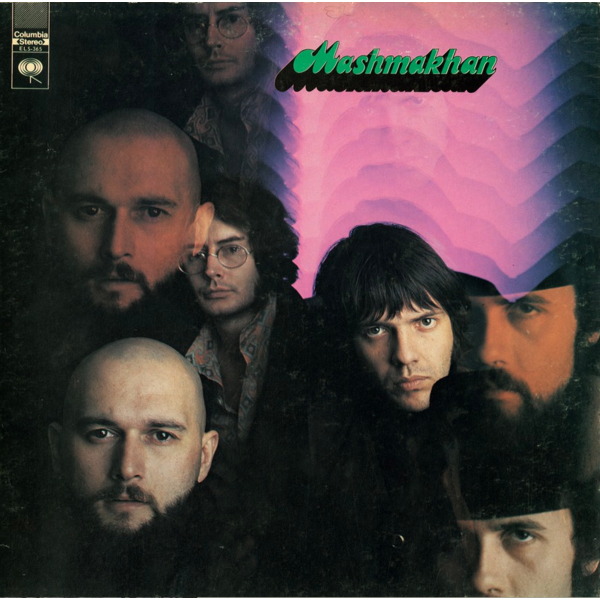
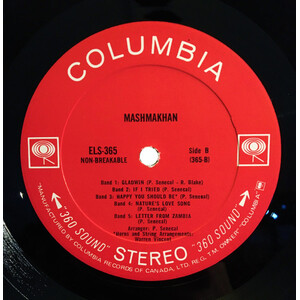
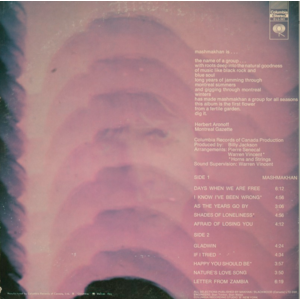
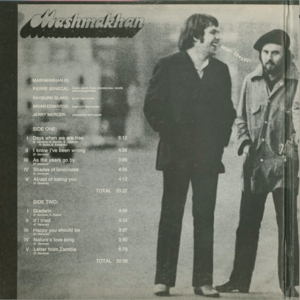
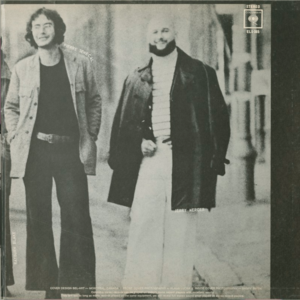
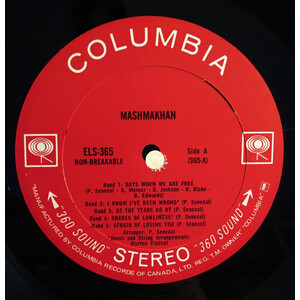
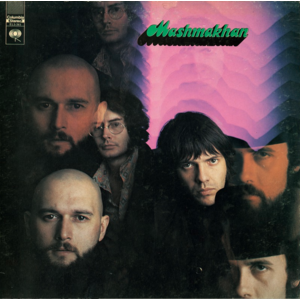
No Comments